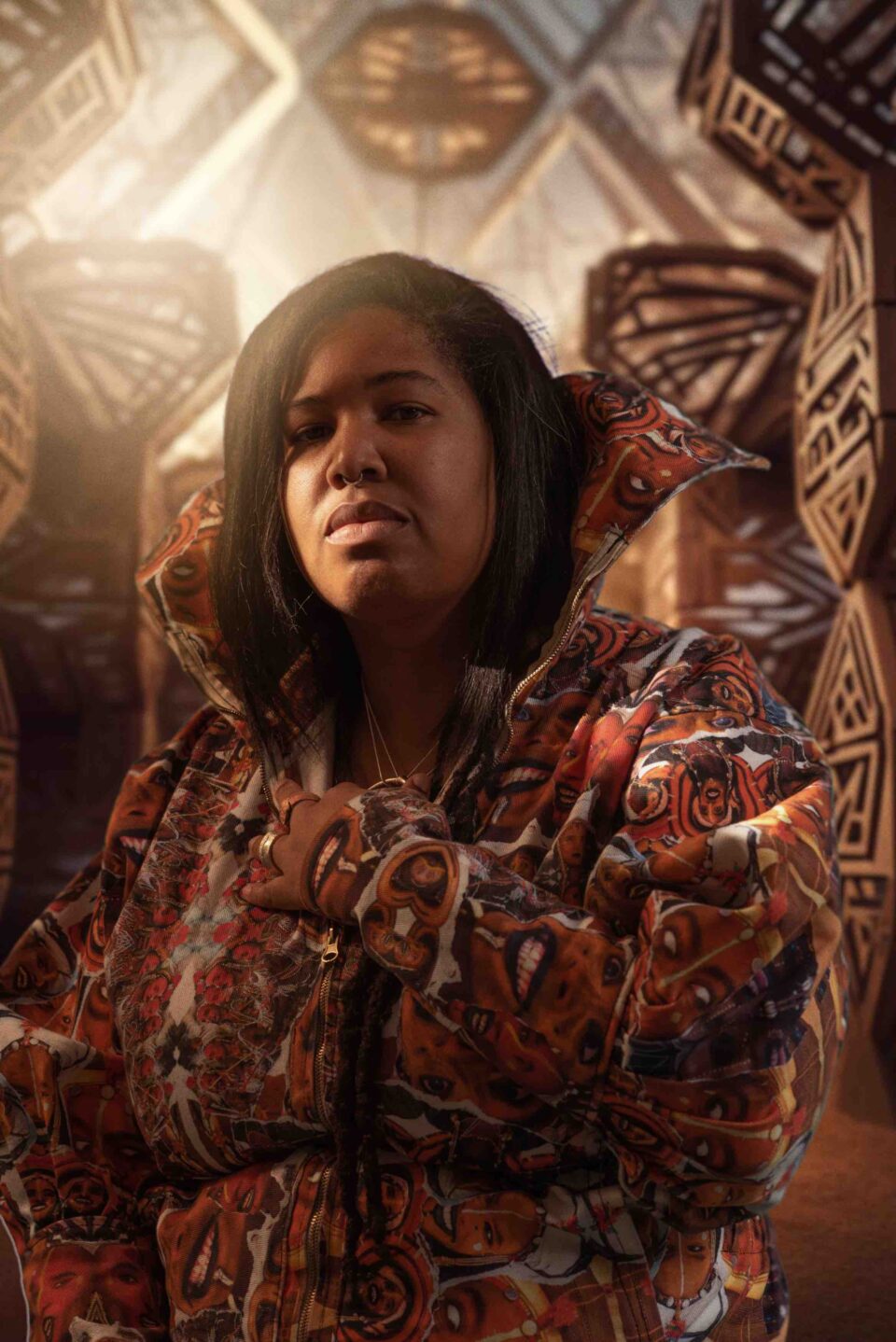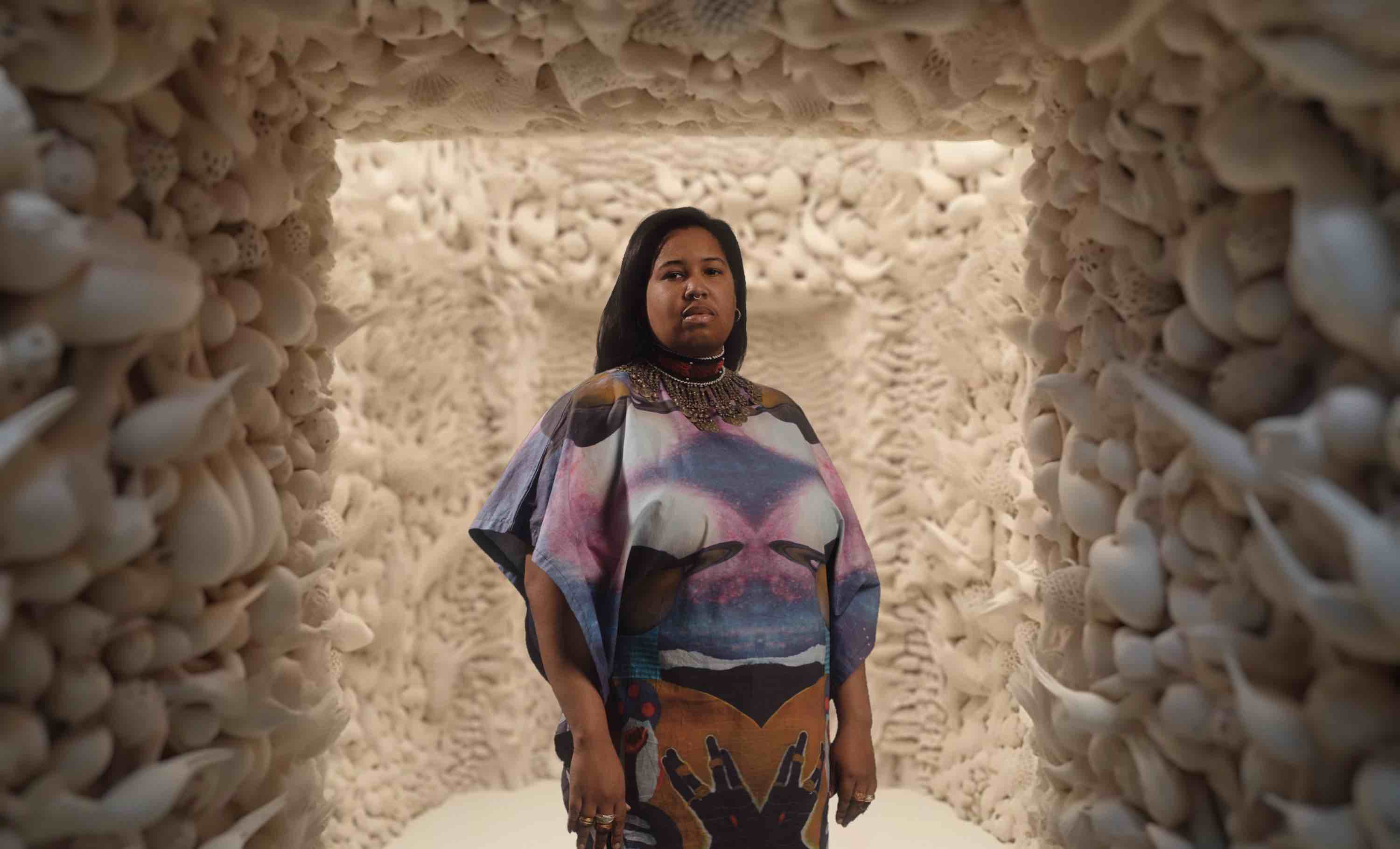In a Melbourne park, Divide and Dissolve’s Takiaya Reed is surrounded by trees. Above the band’s saxophonist and guitarist, there’s a slight gap in the canopy where the sun beams through so brightly that it almost warms the Zoom screen some 8,000 miles away from my laptop stationed in Oregon. The quickest way (beyond Zoom) to get there from the Pacific Northwest is to travel west to east—backward, as it were, through time. Reed herself made a similar journey, albeit a slightly longer one, from her home state of Texas to the Australian city where she now resides and has permanent residency.
It’s there, in 2016, where she met percussionist Sylvie Nehill. Brought together by, among other things, their Indigenous roots—Reed is of Tsalagi (Cherokee) and African-American heritage, while Nehill is of Māori and white-Australian origin—the pair soon formed Divide and Dissolve as a means of reconnecting with those roots.
Traversing a few thousand miles across this current plane of existence is nothing compared to just how far back Divide and Dissolve’s music reaches across time, space, and distance. That’s always been the case. In an interview with Bandcamp in 2018, the band explained how their music—intensely visceral and loud instrumental doom metal, for want of a more nuanced description—focused on “Indigenous sovereignty, decolonization, our ancestors, Black power, [and] destroying, disestablishing, decentralizing, dismantling white supremacy.”
Indeed, the titles of the first seven songs (of eight) on 2017’s debut album Basic read like a list of their ideologies. Combine that with their fearless political activism (the video for “Resistance” from 2018’s Abomination, for example, follows Reed and Nehill as they use super soakers to spray urine on Australian colonial monuments, including Captain Cook’s Cottage) and you’d expect a ferociously political mindset to be Reed’s default state from the off. It’s not.
“Music has always made me feel so safe and relaxed. It’s always been a place of good memories and this ultimate liberation in myself, externally and internally.”
In fact, she seems overwhelmingly happy and at least initially hesitant to get drawn into any heavy political conversations. Rather, she speaks in broad brushstrokes about the band’s new record Systemic, how it’s “just a continuation of all the other things that have happened,” and how she’s “really grateful and excited” that people can now hear it. She also posits that the throughline of the album and its predecessors isn’t their defiance of and opposition to the injustice and inequality and the inherently racist systems against which they all rail, but something gentler and kinder than protest. “I think it’s love,” she says, and it almost sounds like this is an epiphany that’s just come to her at this very moment, though that’s undoubtedly not the case. “Love is the power. It’s such an important force, and it’s the connection point for absolutely everything.”
Was the intention with this record, then, to make love a dominant force in people’s lives again? “This record,” she says, touching her hand to her chin as she thinks, “was just, like…”—a good few seconds pause—“...it was just so fun to make. I love making music so much, and I deeply appreciate getting to do that.”
“Love is the power. It’s such an important force, and it’s the connection point for absolutely everything.”

Like 2021’s Gas Lit, Systemic was made with Unknown Mortal Orchestra’s Ruban Nielson, and it was designed, like everything Divide and Dissolve have done, not just to be heard, but to be felt deep inside your soul and bones. That isn’t because of any particular intention or philosophy, Reed says, but just because that’s the kind of music that truly moves her. It offers her solace from the outside world and its nefarious power structures. That sense of sanctuary is, like many things in life, tied to her learning saxophone as a child after her father suggested she take it up. “My dad was like, ‘You’re going to play saxophone. You look like a sax player!’” she remembers with a grin. “I was like, ‘Really? OK.’ And when I picked it up, I was like”—she puts on a hesitant voice—“‘Okaaay.’ But then I was like, ‘Oh, this comes quite naturally to me, I feel like I’m supposed to be doing this.’
“I was always amazed at how free I felt and at my love of classical music,” she continues. “And I was pretty enamored with the instrument and the process of learning. I knew that I was going to need to take a lot of time to learn this instrument, so I did. I practiced for hours every day as a child. I made a commitment to learning this instrument, and fortunately I’m able to play it in this band and in this very unique way. It’s very intuitive. If I feel a little stressed, I’m like, ‘Oh, is it because I haven’t played music in a while? Yeah, that’s probably it.’ Music has always made me feel so safe and so relaxed. It’s always been a place of good memories and this ultimate liberation in myself, externally and internally.”
That, then, is the crux of Divide and Dissolve: the sheer joy that Reed gets from making and playing this dark, unrelenting, and often brutal music. Indeed, while the band still maintains those core tenets close to their hearts, it seems that with Systemic—after the making of which Nehill stepped away from performing live—they’ve fully embraced the idea of joy as an act of rebellion. On the surface that might not seem as radical as the ideals that have propelled the band throughout its existence, but Reed makes the point that, in fact, it’s probably the most radical thing they could do.
“Me as a Black and Indigenous person being in my joy and being in my relaxation in a world that’s devastated by colonization and overrun with white supremacy—my joy is in opposition to those forces,” Reed says. “I’m just like, ‘Oh, hell yeah!’ I want people to feel really good when they’re listening to the music. I would love for them to feel as good as I feel making it, because I just feel so relaxed.”
“Me as a Black and Indigenous person being in my relaxation in a world that’s devastated by colonization and overrun with white supremacy—my joy is in opposition to those forces.”
To that extent, Divide and Dissolve is also very much an anti-capitalist project—because white supremacy and the forces that refuse us relaxation are products of that system. “Capitalism is such a trap,” she says. “It’s literally cheaper for the government to have universal healthcare, but it’s a choice to make people suffer in this way.” While the lack of healthcare isn’t the main reason she decided to leave the US for Australia (“It’s beautiful here,” she says, the sun forming a halo of sorts around her head, “but it’s complicated”), the fact that she did leave allowed her to start this band. It’s something—along with the joy that comes from it—that she hopes she can use to change the world and the systems that ultimately gave birth to and inspired it.
Asked if she thinks music has the power to do that, she nods without hesitation. “One hundred percent,” she says. “It has to. Music is medicine, and it’s used to heal people. Our bodies are very intricate systems, ones that we don’t fully understand. But music can heal our systems and our bodies. It’s very powerful. Imagine if people had better health—that would in turn affect mental health and outcomes for people. There’s so much power in it. But we all have to work together to create change. No one does anything by themselves.” FL







